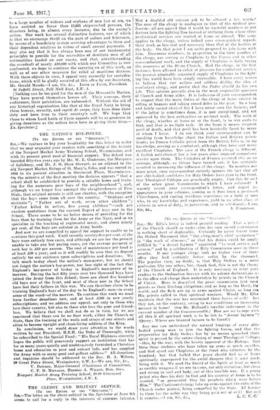May a disabled old veteran ask to be allowed a
few word*? The case of the clergy is analogous to that of the medical pro- fession: all are agreed that it would be wasteful madness to put doctors into the fighting line instead of utilizing them where their professional services aro wanted at home or abroad. The same applies to the clergy, unless indeed your correspondent regard's their work as less real and necessary than that of the healers of the body. On that point I am quite prepared to join issue with him. Enormous numbers, in proportion to the total number cf the clergy, are serving as Chaplains to the Forces and in other non-combatant work, and the supply of Chaplains is daily taxing the resources of the Home Church. Had the clergy, in the first instance, been allowed to enlist at pleasure for combatant service, the present admirably organized supply of Chaplains in the fight- ing lino would have been simply impossible. I have every reaeon to believe that our sailors and soldiers dislike the idea of combatant clergy, and prefer that the Padre should do hie own job. This opinion prevails also in the most responsible quarters of Church and Army alike. It is ludicrous of your correependoet to suggest that the main duties of the clergy at home consist in selling at bazaars and taking round doles to the poor. In a long and fairly varied clerical life I have never seen the former; and if the latter is sometimes done, it is now exceptional, and nol approved by the best authorities on pastoral work. The work of the clergy, whether at home or at the front, is to win souls to God, and that is no light task. At the front it means frequent peril of death, and that peril has been heroically faced by many of whom I know. I do not think your correspondent can be speaking from knowledge about the Italian and Belgian priest- hoods; no Roman Catholic priest from the British Isles is. to my knowledge, serving as a combatant, although they have sent many excellent Chaplains. The case of the French clergy is different. A foolish anti-clerical law a few years since imposed compulsory service upon them. The, Catholics of France resented this as an outrage, although, as things have turned out, it has certainly resulted in increasing the influence of the clergy. To mention one more point, your correspondent entirely ignores the fact that all our able-bodied candidates for Holy Orders have gone to the front. Our Theological Colleges are practically empty. Can this be sell of the other great Communion to which I have referred? I warmly resent your correspondent's letter, and regret its appearance in your columns, coming as it does from a prof geed Churchman, and casting invidious aspersions on a body of men who, to my knowledge and experience, yield to no other class of citizens in sense of duty, in patriotism, and in self-denial.-1


































 Previous page
Previous page